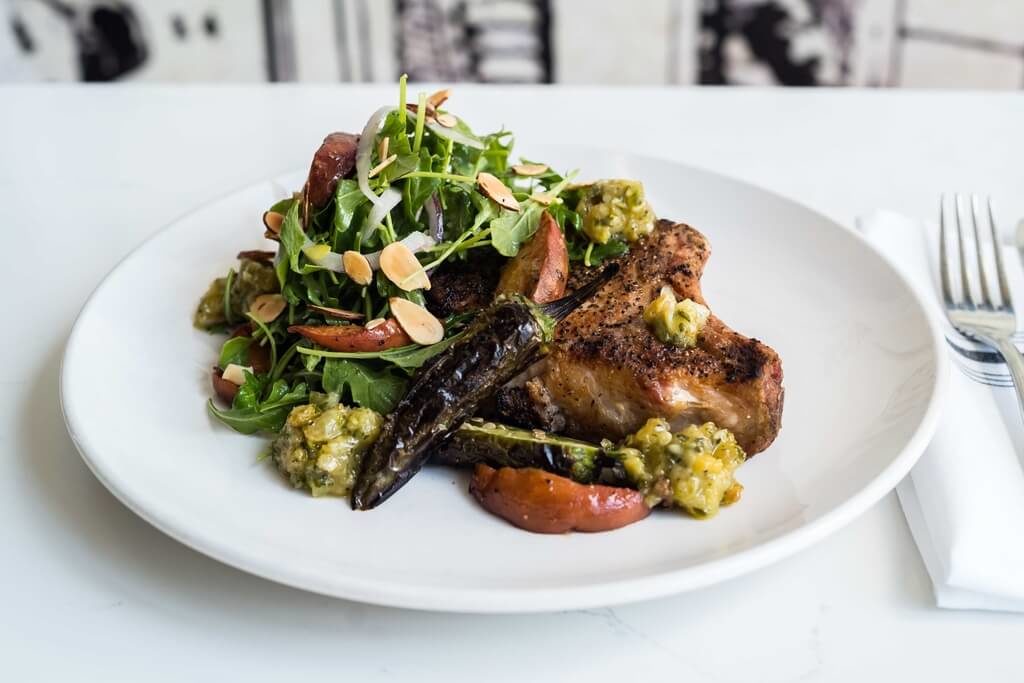Chef Brad Wise, executive chef and co-owner of TRUST Restaurant in San Diego, has been busy opening nearly three different concepts over the last three years. Although Wise has had his eyes on several projects, the integrity of his dishes remains solid.
TRUST was the first solo project for Wise and general manager and co-owner Steven Schwob. Since opening, the restaurant continues to rack up accolades including Eater’s “Neighborhood Trailblazer” award and San Diego Magazine’s Critic’s Pick Best New Restaurant of 2017 and Critic’s Pick Best Restaurant of 2018 among others. Wise has also been selected to cook at the James Beard House on October 3.
The duo’s second venture, Hundred Proof in the University Heights neighborhood, opened its doors a little over a year ago with a concept centering around redefined bar food. This fall, Wise and Schwob are set to open their third restaurant, Fort Oak in San Diego’s Mission Hills neighborhood.
Wise shared his keys to greatness when opening and running multiple locations, how to create and maintain synergy between the front and back of house, and the driving force behind his success.
What was your greatest challenge when venturing out as a food entrepreneur and how’d you overcome?
Hoping that people were going to walk in the door and keeping it consistent so that they would come back.
For those looking to venture out on their own, what advice do you have before they leap?
Make sure you have your team in place because you can’t do it on your own.
With two successful locations, Trust & Hundred Proof, and now embarking on a third, what did you learn as you expanded your footprint?
I learned that every venture is different, and every restaurant concept/model is different. You need to be able and willing to adapt to make it work. Have a vision, don’t give up, set goals and do everything you can to hit your goals.
What’s your advice for those looking to expand to multiple locations?
Make sure your deal is right, hire the best people you can.
Along the same lines as above, any mistakes made while opening a second or now third location?
We make mistakes day in and day out. It’s not about the mistakes you make or have made; it’s about making sure you don’t make the same mistake twice. Learn to pay attention to the details.
When building a team, what are some characteristics you look for in candidates?
Passion, discipline, work ethic and they must be respectful. If you show respect and lead with respect, people will show the same respect. We are also looking for candidates that are likable.
Any specific tips or advice for creating synergy between the front and back of house?
The front of the house and back of the house need to remember that the guest is first. Nothing else, including egos and bickering, matters. The lead team members must have the same goal in mind. At our restaurants, that goal is to give exceptional service. If everyone is working towards the same result, the synergy will organically evolve.
Are there ways you incorporate team members into higher-level decisions to foster growth or collaboration?
If you include your team members in high-level meetings and they hear you make “high-level decisions,” it will rub off on and inspire growth and collaboration in whoever wants to pay attention.
When you’re creating or altering the menu, how do you incorporate your culinary team, if at all?
I put everything up for discussion and make it known what menu items we are going to change. I welcome all input. Three or more minds are better than one. Everyone has a different outlook on food. That’s what makes this industry great.
What’s been the single greatest factor to your success as a food entrepreneur up to this point?
There are two. The first is that people told me that I was crazy for going into this business when I was younger. Fast forward 15 years, and I am doing okay for myself. The second is that most people come to eat at our restaurant because they genuinely like our establishments and return. That is a great feeling of accomplishment.
How important is mentorship to you and your businesses and what’s your advice for those trying to build this into their culture?
It starts from the top. If you don’t mentor your team, there is no legacy to leave. You’re only as good as your weakest person. Therefore you need to do your due diligence on developing your team.
What’s your final advice for our audience of food entrepreneurs?
This industry is the best! Let’s try to make it even better with one great guest experience at a time.
About the Author
Jenna Rimensnyder is a staff writer and content specialist for Entrepreneurial Chef, having studied Journalism, Media, Food Writing & Photography from the University of South Florida. She combines her love of writing and passion for food to capture stories of inspirational food entrepreneurs and spread across the web. Follow along at JennaRimensnyder.Com.

Entrepreneurial Chef Magazine
Get Your First Issue FREE
What do the most successful food entrepreneurs share with us? How did they build & grow their businesses? Get a taste with a free issue of the new digital mag for food entrepreneurs!










